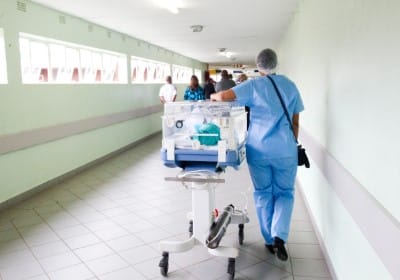Antigua and Barbuda is a small collection of islands in the West Indies and is a popular tourist destination and investment hotspot. This twin island nation, bordered by the Caribbean Sea and the Atlantic Ocean, has a respectable healthcare system in the Caribbean.
We’ll outline key information regarding Antigua healthcare services, from the infrastructure and treatment available to tips for expats visiting Antigua and Barbuda.
The Antigua and Barbuda Healthcare System
In this section, we’ll provide an overview of the health system in Antigua and Barbuda.
Antigua and Barbuda healthcare infrastructure
Antigua and Barbuda is a renowned health and medical care provider in the Caribbean region. In fact, the Mount St John’s Medical Center, in the capital city of St John’s, is the most modern hospital among the Caribbean islands. The center also has a smaller extension of the hospital in Barbuda that holds eight beds. However, as infrastructure improves and develops, the number of health centers is increasing.
The nation consists of six medical districts, each of which has a medical officer appointed to carry out medical treatmet. Health centers are located within three kilometers of each major settlement and are responsible for delivering primary care. Antigua is home to 25 public health clinics that provide services ranging from dentistry to testing for non-communicable diseases (NCDs).
Antigua and Barbuda has a National Drug Formulary that is part of the public healthcare system and provides 380 different types of drugs. This guarantees that everyone with chronic conditions can have access to the necessary medications.
Is healthcare free in Antigua?
Most healthcare in Antigua is free through Medical Benefits Scheme for those with legal status in the country. A payroll tax sets aside revenue that pays for universal health coverage, including mental health treatment. The Ministry of Health governs the country’s health sector and receives funds from the Ministry of Finance.
Antigua Government Healthcare Expenditure

The government has also created special policies and plans for mental health, non-communicable diseases, aging, and health information systems, as you will see below. The government has updated legislation meant to regulate healthcare providers with the view that many of our current health issues must be addressed within a legislative framework. It has also created new legislation for food safety and tobacco control and is building a National Strategic Plan for health.
Most healthcare in Antigua is free through the Medical Benefits Scheme. Through the scheme, the nation’s government provides free-of-cost medication, medical treatment, and medical supplies to individuals diagnosed with chronic non-communicable diseases such as chronic respiratory disease, diabetes, cardiovascular diseases, and cancer.
Many of these conditions are related to lifestyle and can, therefore, be prevented through cost-effective measures focused on diet, exercise, obesity, and decreased tobacco use and alcohol consumption. As such, the scheme now includes prevention and targets child health as part of its programs.
Antigua Health Policies
The health systems in Antigua and Barbuda are largely financed and operated by the Government, while many agencies have provided cooperation in health on the islands throughout the years.
In addition to establishing a private-public partnership (PPP) with the Cancer Center of the Eastern Caribbean for the provision of affordable quality healthcare and cancer treatment, the Ministry of Health has implemented several plans:
- A non-communicable disease policy and action plan
- A mental health policy
- A National Policy on Aging
Antigua and Barbuda has also taken steps to fulfill the core capacities of the International Health Regulations (IHR). For instance, the nation is a member of the International Atomic Energy Agency, which enables the response of the medical system to radiation emergencies (core capacity 13).
World Health Organization (WHO) Cooperation
The World Health Organization/Pan American Health Organization provides help through funded projects and other initiatives. The WHO has also put the Country Cooperation Strategy in place, which will be in effect until 2024.
The WHO has five main areas of focus. The first is establishing a more universal healthcare system to enable universal health coverage for more citizens. This will mainly be achieved by strengthening the Primary Health Care (PHC) to better align with citizens’ needs.
The next priority concerns eliminating diseases and NCDs, while priority three focuses on reducing risk. Measures to reduce NCD cases include the integration of mental health and substance abuse in the PHC.
Natural Disasters and Disease in Antigua
Antigua and Barbuda’s history of natural disasters is primarily related to hurricanes. While the risk of hurricanes for those living in Antigua is quite low – with only a 33 percent chance of a hurricane affecting the island each year – the nation has been plagued by several hurricanes, such as Hurricane Hugo in 1989 and Hurricane Irma in 2017.
Hurricane Irma left Barbuda uninhabited for the first time in modern history, with Barbuda’s population evacuating to Antigua.
However, the effects of these hurricanes can be more severe. For example, they can threaten the island’s food security, quality of water, tourism, and even the health of citizens.
While natural disasters (including tropical storms) pose many challenges to the islands, diseases are not that prevalent in the nation. In fact, tuberculosis and HIV/AIDS affect less than 1 percent of the total population.
Antigua health and mortality rates
Here are some key statistics for Antigua’s country profile regarding health issues, including mental health disorders, infectious diseases, and mortality rates based on data from the WHO, the World Bank, and UNICEF.
Statistic | Rate |
Life Expectancy (2021) | 79 years old |
Infant Mortality Rate (2021) | 5 per 1,000 births |
Mortality Rate from Communicable Diseases (2019) | 59.3 per 100,000 |
Age-adjusted Mortality from External Causes (2019) | 34.5 per 100 000 |
Cancer Mortality Rate (2019) | 42.1 per 100,000 |
Mental, eurological, substance use disorders and suicide (MNSS) (2020) | 4,290 per 100,000 |
HIV infection incidence rate (2021) | 55.8 per 100,000 |
Healthcare Facilities in Antigua and Barbuda

The country boasts several qualified general practitioners and specialists, as well as well-equipped testing clinics. It is important to note that while Antigua and Barbuda’s healthcare services are known to be adequate, there are some major conditions that cannot be treated. As such, you should check in advance if the facility near you can treat any conditions you and your family may have.
For tourists, most hotels have general practitioners as part of their staff. If there isn’t one, you can ask the front desk or reception for a recommendation for the appropriate doctor or specialist. Alternatively, you can find a doctor, ophthalmologist, or dentist in the local telephone book, as their contact information is listed there, or through online searches.
St John’s Medical Center
Mount St John’s Medical Center, the main medical facility located in Antigua, is a 185-bed teaching hospital that is accredited by the Caribbean Medical Council Association and adheres to international standards. Services provided include casualty, intensive care, maternity, pathology, pharmacy, radiology with the latest digital technology, surgery, a children’s ward, and a special care unit for babies born prematurely.
The Center also offers health promotion and prevention programs for diabetes and hypertension, as well as antenatal care. In addition to this, the hospital has its own blood bank and provides medical treatment for dialysis, nephrology, oncology, reconstructive surgery, and physiotherapy and rehabilitation. Finally, there are four institutions that cater to the sick and aged.
Additional infrastructure
The Adelin Medical Center is a private hospital that is open 24 hours a day. It provides a variety of services, including general medicine, ENT, ophthalmology, obstetrics, gynecology, pediatrics, endoscopic surgery, orthopedics, dentistry, X-rays, and physiotherapy.
The Fiennes Institute is an elderly healthcare facility that provides quality care for elderly citizens and residents. It has 100 beds, six wards, and a staff of over 20 nurses. This type of facility can be particularly useful for expats looking to retire to Antigua and enjoy their golden years basking in the nation’s sunlight.
Most pharmacies open at 9 am and close at 5 pm, from Monday to Saturday. Ceco Pharmacy is a 24-hour pharmacy open every day of the week and provides full prescription services. Pharmacies can also be found at the Woods Shopping Centre and at Jolly Harbour. No pharmacies are currently located in the English and Falmouth Harbour regions. The majority of the nation’s pharmacies are concentrated in St John’s, making it one of the best cities to live in Antigua.
Health Advice for Expats Traveling to Antigua and Barbuda
Expats who require medication are advised to bring sufficient supplies of all medications in their original labeled containers for their visit to Antigua. In addition to their medication, expats should have:
- A dated and signed letter from their primary doctor describing their health condition
- A list of the medication
Expats should also ensure that they have proper health coverage and sufficient accessible funds for payment of any medical treatment and repatriation they may require during their visit.
You should visit your doctor at least four to six weeks before your trip to confirm whether you require any vaccinations. When visiting or relocating to Antigua and Barbuda, there are some important points to consider:
- Dengue fever is endemic to the Caribbean region and can strike throughout the year.
- UK health authorities categorize the nation as a risk area for the transmission of the Zika virus.
- There have been confirmed cases of Chikungunya virus in the nation.
Antigua and Barbuda citizenship by investment
As an Antigua citizen, healthcare will be easier to navigate, including accessing medical treatment in central and rural areas. A popular route to obtain citizenship is through Antigua and Barbuda’s Citizenship by Investment Program.
By making a qualifying investment of at least $100,000 in the country’s economy, foreigners and their family members can obtain citizenship in an average of three to four months.
While known for its world-famous beaches and stunning landscape, the Antigua and Barbuda government places significant importance on the health and well-being of its citizens compared to other countries in the Eastern Caribbean.
While Antigua and Barbuda healthcare may not be the first thought that comes to mind, it is an important consideration when traveling or relocating to the island. Like many countries, Antigua hospitals provide skilled doctors, preventative care, antenatal care, private clinics, and more, ensuring the country’s population is cared for in the best way possible.
Frequently Asked Questions about Antigua and Barbuda Healthcare
What types of healthcare facilities are available in Antigua?
A network of 26 community health facilities, one public hospital in Antigua, and an eight-bed medical facility in Barbuda provide healthcare services and medical treatment to the local and expat inhabitants of Antigua and Barbuda.
How can tourists access medical care in Antigua?
Tourists visiting Antigua and Barbuda should ensure they have comprehensive travel insurance or international health insurance. This will enable you to access quality healthcare and receive medical treatment without incurring high out-of-pocket expenses.
What is the process for obtaining prescription medications in Antigua?
You can generally purchase common medications over the counter at any of Antigua and Barbuda’s pharmacies. However, you will need to obtain a prescription from a licensed physician for prescription medications.
Are there any recommended vaccinations before traveling to Antigua?
There are currently no vaccinations necessary when traveling to Antigua and Barbuda unless you are coming from an endemic area. General vaccination recommendations when traveling include:
- Chickenpox
- Flu
- Polio
- Shingles
- Measles-Mumps-Rubella (MMR)
- Diphtheria-Tetanus-Pertussi
- Hepatitis A and B
- Rabies
- Tuberculosis (TB)
Additional vaccines that may be beneficial include rabies, Hepatitis A and B, typhoid, and yellow fever.
How does the health insurance system work in Antigua for foreigners?
There is no state health insurance system in Antigua and Barbuda, so there is no need to apply to join it. However, as a resident of the country who requires medical treatment, you can access the public healthcare system by visiting a public healthcare facility. Foreign residents can access the public healthcare system but may be required to pay a fee
What emergency medical services are available in Antigua?
The Antigua Barbuda Emergency Medical Services provides urgent pre-hospital treatment and stabilization for serious illnesses and injuries, including on-scene treatment for those requiring urgent medical care. They also provide transport to definitive care.
What languages are spoken in medical facilities in Antigua?
Healthcare providers speak English, as this is the official language in Antigua and Barbuda. They may also speak local dialects.
Are mosquitoes bad in Antigua?
In common with many tropical destinations, there exists a risk of insect bites from mosquitoes and sand flies in Antigua. However, the country does not pose a risk of contracting mosquito-related diseases, including as malaria or yellow fever.
Can you buy antibiotics over the counter in Antigua?
Travelers visiting Antigua and Barbuda can buy over-the-counter painkillers like aspirin, paracetamol, and ibuprofen. However, antibiotics are categorized as prescription drugs in Antigua, requiring a prescription from a local doctor to obtain them.
Can you get dengue fever in Antigua?
There have been reported cases of the mosquito-borne virus dengue fever in Antigua And Barbuda, and the nation also carries a risk of mosquito-borne viruses such as zika and chikungunya.



